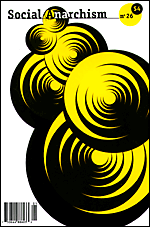Ecofascism
My early research on American free thought revealed a surprising fact: I discovered that among freethinkers there was a right wing and even a racist current. It seemed incomprehensible that people who had emancipated themselves from superstition in the name of reason could still be slaves of their prejudice. In the same way, people in the Green movement may be surprised to find out that nazis could claim that some of their predecessors were pioneers in the cult of nature, vegetarianism, respect for wilderness and so on. Rather than waiting for outsiders to point out some of the apparent similarities between both trends — as has been the case in France, for instance — Janet Biehl and Peter Staudenmaier, two social ecologists, have undauntedly dealt with the issue. Their purpose is as clear as their style is straightforward, and makes for easy reading: present the German version of "ecofascism," show its difference from social ecology and alert the American Greens on the dangers of certain current trends. The first essay, by Peter Staudenmaier, entitled "Fascist Ecology: The 'Green Wing' of the Nazi Party and its Historical Antecedents," examines the ideological genealogy of a trend which goes back to the nineteenth century Romantic tradition and ends up with the Holocaust. The second article, by Janet Biehl, "'Ecology' and the Modernization of Fascism in the German Ultra-Right" covers the political genealogy of the movement, from the 1920s völkish current to the early 1990s. Both writers have delved into the German sources and highlighted some very significant and appalling facts. Indeed, anyone interested in the Green movement should read the book. Staudenmaier reminds us of the political volatility of ecology when he writes: "the slogan advanced by many contemporary Greens, 'We are neither right nor left but up-front' is historically naive and politically fatal. The necessary project of creating an emancipatory ecological politics demands an acute awareness and understanding of the legacy of classical ecofascism and its conceptual continuities with present-day environmental discourse" (26). In fact, neither the Left nor the Right are immune to fascist proclivities.
It is too rare a feat not to be noticed that, in contrast with many other anarchist thinkers whose ideas have hardly generated any school of thought, Murray Bookchin's pioneer social ecology has not been a voice crying in the wilderness but has prompted thoughtful advocates and critics. Both essays, and particularly Biehl's, invite the reader to refer to many of the arguments expanded in The Ecology of Freedom.
The main thrust of the authors' work is to alert the reader to the necessity of a social theory to prevent ecology from sinking into abysmal confusion, particularly through a purely biological view of humanity or a surrender of reason to mysticism. While these statements may be valid, they call for some comments.
According to a well-argued interpretation, which is not dominant among historians, fascist ideology was an onslaught on the values of the Enlightenment. There is considerable truth in such an argument, but it cannot be generalized. To begin with, mysticism does not necessarily lead to fascism, nor is it the only road to it. In the German situation, the revolt against the Age of Reason inspired the Nazi vision of the world; yet, Michael Löwy has shown that it also was a vehicle of revolt among German Jewish anarchists. On the other hand, national-socialism also revealed a very strong rationalistic trend in the way it proceeded to exterminate the Jews. Obsession with logic, efficiency, technical organization, and adaptation of means to ends were omnipresent.
Whether they were religious or not, a number of fascists did join ecological groups or discussed man's and woman's relation to the land. But though there is a fascist interpretation of nature and the world, that does not necessarily qualify it as being "ecological." Janet Biehl appropriately uses brackets every time she mentions Nazi 'ecology'. One may indeed wonder if national-socialist ideology had anything in common with ecology. Fascists were masters at coopting every fashionable or current idea, including those coming from socialist or anarchist constituencies, in trying to infiltrate every group and association, and at making any equivocal statement when concessions were necessary. They were not antihumanists: humanity simply did not belong to their reptilian view of the world. Treating human beings in terms of races amounts to reducing people to horses, dogs, and guinea pigs, and social exchange to the pecking order of chickens. Downgrading nations and ethnic groups to the status of hordes, being enraptured with the glorious past when men lived in the forests, such are the pathetic wish-dreams of returning from the Age of Enlightenment to the age of the dinosaurs. This is why rational arguments will never convince lunatics: you have to wake them up to their immediate reality.
One may hope that Janet Biehl and Peter Staudenmaier's book will inspire more comparative research. If 'ecology' or preoccupation with the environment are an indispensable ingredient of fascism, then this trend should also appear, for instance, in the Italian case, since after all it was the prototype of fascism.
Furthermore, the use and abuse of the biological model appears not only in the case of fascism but, as the authors rightly say, in Darwinism. Kropotkin might have added that, after all, biological criteria are also selective: instead of bringing up the struggle for life example, one might show all the instances of fruitful cooperation that have been left out by the archetype. In fact, are not biological paradigms the projection of human social views?
As both authors insist, ecology has to be mediated through some theory of society. More than singling out one particular variable, such as "mysticism" vs "rationalism," it is the fact that fascism cannot escape from an ideology of oneness and sameness. Fascism cannot build a theory that comprehends difference and complexity, that leads to its rejection of otherness, its objectification or demonization of the other, and ultimately its drive to annihilate the other. It is a regressive culture of dereliction and death.

